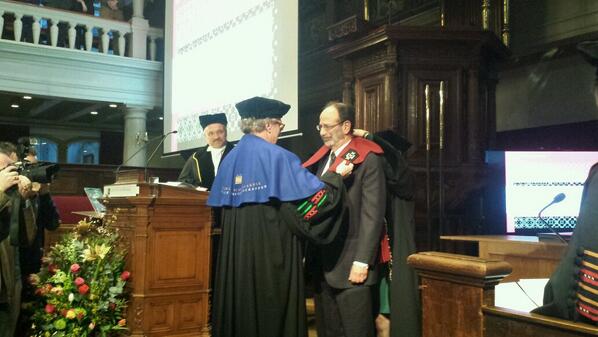Gary Becker and Julio Elias have a reprise of their 2007 Journal of Economic Perspectives paper in this weekend's Wall Street Journal, in a cogent column called Cash for Kidneys: The Case for a Market for Organs.
Their 2007 JEP paper was called Introducing Incentives in the Market for Live and Cadaveric Organ Donations (slightly more direct link here).
Between then and now the number of people on the waiting list for kidneys has gone up. Their 2007 article has these sentences: "Almost 17,000 persons were waiting for a kidney transplant in 1990. But this number grew rapidly, so that about 65,000 persons were on this waiting list by the beginning of 2006."
This weekend's WSJ column starts with the sentence "In 2012, 95,000 American men, women and children were on the waiting list for new kidneys, the most commonly transplanted organ."
So, the arguments that they repeat have gotten stronger over time: the shortage of organs is costly in every sense, and could likely be relieved by allowing kidneys to be bought and sold by live donors, and allowing the purchase of organs from deceased potential donors, i.e. by repealing the part of the 1984 National Organ Transplant Act that makes such sales a felony in the United States. (Similar laws exist in most of the developed world: the only country that seems to have an explicitly legal market for kidneys is Iran, although many black and grey markets exist.)
So, why hasn't this argument made any headway, either in the U.S. or overseas? Is patient repetition of the argument the best way to make the case? I don't know the answers, but I think that the repugnance of organ sales is a subject worth studying, not just for science but also for those who might like to influence policy.
In the same issue of the JEP as Becker and Elias (2007) was my article Repugnance as a Constraint on Markets (more direct link here), which sought to understand not just the repugnance to kidney sales, but to many economic transactions, in different places and times, e.g. to charging interest on loans, or having markets for slaves or indentured servants. I noted that kidney exchange doesn't arouse the repugnance that sales do. I've since blogged about a lot of different repugnant transactions including compensation for donors (as of this writing my most recent post on transactions that some regard with repugnance is headlined Womb transplants in Sweden (where surrogacy is illegal)...)
Note that the prohibition on organ sales is not some law that remains on the books merely through inattention. This is illustrated by the recent events surrounding the tug of war over whether it might be legal to compensate (even) bone marrow donors. Briefly, the ninth circuit court of appeals issued a ruling that said that in some circumstances bone marrow donors could be compensated, but then the Department of Health and Human Services proposed regulations that would keep the ban in place. So the opposition to organ sales--even to compensating bone marrow donors--is alive and well.
But things don't go all in one direction. Bob Slonim reminds me that while we rely on unpaid donation of whole blood in the United States, most of our supply of blood plasma comes from paid donors.
I've participated in some efforts to understand better the repugnance to compensating organ donors, e.g. here's a survey with Steve Leider about who disapproves of kidney sales, and some correlates of such disapproval:
Leider, Stephen and Alvin E. Roth, ''Kidneys for sale: Who disapproves, and why? American Journal of Transplantation 10 (May), 2010, 1221-1227.
More recently, Muriel Niederle and I conducted a different sort of survey, which assessed the relative willingness of Americans to contemplate monetary rewards for the heroism associated with kidney donation:
"Niederle, Muriel and Alvin E. Roth, “Philanthropically Funded Heroism Awards for Kidney Donors?” forthcoming in Law & Contemporary Problems, 77:3, 2014.
Judd Kessler and I have a paper forthcoming in the American Economic Review papers and proceedings (May 2014) called "Getting More Organs for Transplantation," in which we summarize the issue this way:
"Kidney sales are often the leading example of a repugnant transaction cited by those who would put stricter limits on markets in general (e.g. Sandel 2012, 2013), because of their sense that such sales arouse widespread opposition. A representative sample survey of Americans conducted by Leider and Roth (2010) suggests that disapproval of kidney sales correlates with other socially conservative attitudes, but that it does not rise to the level of disapproval of other repugnant transactions such as prostitution. In addition, there is evidence that the manner of the payment to an organ donor may mitigate some of the repugnance concerns. Niederle and Roth (forthcoming 2014) find that payments to non-directed kidney donors are deemed more acceptable when they arise as a reward for heroism and public service than when they are viewed as a payment for kidneys."
That paper closes with this thought on the presently available options:
"While these potential donors could save thousands of additional lives, at current rates of medical need, these donors alone would not be able to supply all the demand. Consequently, we must continue working on numerous fronts to solve this growing problem. "
In summary, the issue of whether and how organ donors might be compensated is an important policy issue that also touches on an important and still poorly understood social science phenomenon. Repetition of the basic arguments may move the discussion forward as the background facts become more severe, and it's great to see the issue addressed in such a public forum as the WSJ. But it may also be that repetition of arguments is not enough. To make progress in the face of opposition, it seems likely to be useful to understand better the nature of the opposition.
Their 2007 JEP paper was called Introducing Incentives in the Market for Live and Cadaveric Organ Donations (slightly more direct link here).
Between then and now the number of people on the waiting list for kidneys has gone up. Their 2007 article has these sentences: "Almost 17,000 persons were waiting for a kidney transplant in 1990. But this number grew rapidly, so that about 65,000 persons were on this waiting list by the beginning of 2006."
This weekend's WSJ column starts with the sentence "In 2012, 95,000 American men, women and children were on the waiting list for new kidneys, the most commonly transplanted organ."
So, the arguments that they repeat have gotten stronger over time: the shortage of organs is costly in every sense, and could likely be relieved by allowing kidneys to be bought and sold by live donors, and allowing the purchase of organs from deceased potential donors, i.e. by repealing the part of the 1984 National Organ Transplant Act that makes such sales a felony in the United States. (Similar laws exist in most of the developed world: the only country that seems to have an explicitly legal market for kidneys is Iran, although many black and grey markets exist.)
So, why hasn't this argument made any headway, either in the U.S. or overseas? Is patient repetition of the argument the best way to make the case? I don't know the answers, but I think that the repugnance of organ sales is a subject worth studying, not just for science but also for those who might like to influence policy.
In the same issue of the JEP as Becker and Elias (2007) was my article Repugnance as a Constraint on Markets (more direct link here), which sought to understand not just the repugnance to kidney sales, but to many economic transactions, in different places and times, e.g. to charging interest on loans, or having markets for slaves or indentured servants. I noted that kidney exchange doesn't arouse the repugnance that sales do. I've since blogged about a lot of different repugnant transactions including compensation for donors (as of this writing my most recent post on transactions that some regard with repugnance is headlined Womb transplants in Sweden (where surrogacy is illegal)...)
Note that the prohibition on organ sales is not some law that remains on the books merely through inattention. This is illustrated by the recent events surrounding the tug of war over whether it might be legal to compensate (even) bone marrow donors. Briefly, the ninth circuit court of appeals issued a ruling that said that in some circumstances bone marrow donors could be compensated, but then the Department of Health and Human Services proposed regulations that would keep the ban in place. So the opposition to organ sales--even to compensating bone marrow donors--is alive and well.
But things don't go all in one direction. Bob Slonim reminds me that while we rely on unpaid donation of whole blood in the United States, most of our supply of blood plasma comes from paid donors.
I've participated in some efforts to understand better the repugnance to compensating organ donors, e.g. here's a survey with Steve Leider about who disapproves of kidney sales, and some correlates of such disapproval:
Leider, Stephen and Alvin E. Roth, ''Kidneys for sale: Who disapproves, and why? American Journal of Transplantation 10 (May), 2010, 1221-1227.
More recently, Muriel Niederle and I conducted a different sort of survey, which assessed the relative willingness of Americans to contemplate monetary rewards for the heroism associated with kidney donation:
"Niederle, Muriel and Alvin E. Roth, “Philanthropically Funded Heroism Awards for Kidney Donors?” forthcoming in Law & Contemporary Problems, 77:3, 2014.
Judd Kessler and I have a paper forthcoming in the American Economic Review papers and proceedings (May 2014) called "Getting More Organs for Transplantation," in which we summarize the issue this way:
"Kidney sales are often the leading example of a repugnant transaction cited by those who would put stricter limits on markets in general (e.g. Sandel 2012, 2013), because of their sense that such sales arouse widespread opposition. A representative sample survey of Americans conducted by Leider and Roth (2010) suggests that disapproval of kidney sales correlates with other socially conservative attitudes, but that it does not rise to the level of disapproval of other repugnant transactions such as prostitution. In addition, there is evidence that the manner of the payment to an organ donor may mitigate some of the repugnance concerns. Niederle and Roth (forthcoming 2014) find that payments to non-directed kidney donors are deemed more acceptable when they arise as a reward for heroism and public service than when they are viewed as a payment for kidneys."
That paper closes with this thought on the presently available options:
"While these potential donors could save thousands of additional lives, at current rates of medical need, these donors alone would not be able to supply all the demand. Consequently, we must continue working on numerous fronts to solve this growing problem. "
In summary, the issue of whether and how organ donors might be compensated is an important policy issue that also touches on an important and still poorly understood social science phenomenon. Repetition of the basic arguments may move the discussion forward as the background facts become more severe, and it's great to see the issue addressed in such a public forum as the WSJ. But it may also be that repetition of arguments is not enough. To make progress in the face of opposition, it seems likely to be useful to understand better the nature of the opposition.






